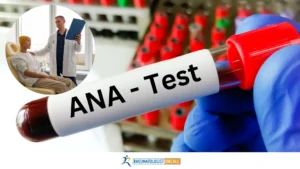SHARE
Are you trying to understand your recent blood test results? Certain laboratory changes can be crucial indicators of rheumatic diseases. These conditions, affecting joints, muscles, and the immune system, often require the expertise of a rheumatologist for proper diagnosis and treatment.
This article will explain five key laboratory changes frequently leading to a rheumatology referral. By understanding these test results, you can t be proactive and ask for appropriate help in a timely manner.
Here are the five critical lab results we’ll cover:
- Antinuclear Antibody (ANA) Test
- Erythrocyte Sedimentation Rate (ESR) and C-reactive protein (CRP)
- Rheumatoid Factor (RF)
- Creatine Kinase (CK)
- Antineutrophil Cytoplasmic Antibodies (ANCA)
Each test can provide valuable insights, but they need to be analyzed together with clinical signs and symptoms.
1. Positive ANA (Antinuclear Antibody)
The Antinuclear Antibody (ANA) test is a crucial diagnostic tool in rheumatology. This blood test identifies specific antibodies that target components within the cell nucleus. In a healthy immune system, antibodies are designed to combat external threats such as viruses and bacteria. However, in some individuals, the immune system can become dysregulated, producing antibodies that mistakenly attack the body’s own cells.
A positive ANA result suggests the presence of these self-targeting antibodies, which may indicate an autoimmune disorder. However, it’s important to note that a positive ANA test alone is not sufficient for diagnosing a specific condition. Rather, it serves as a valuable screening tool that often prompts further investigation.
Rheumatologists commonly use the ANA test when evaluating patients for autoimmune diseases such as systemic lupus erythematosus (SLE) or Sjögren’s syndrome. These conditions, among others, are frequently associated with positive ANA results. However, interpretation of ANA test results requires careful consideration of the patient’s clinical symptoms, medical history, and additional laboratory findings.
It’s worth noting that a small percentage of healthy individuals may also test positive for ANA without having an autoimmune disease. This underscores the importance of expert evaluation by a rheumatologist to accurately interpret the test results within the broader context of a patient’s overall picture.
2. Elevated Markers of Inflammation
Erythrocyte Sedimentation Rate (ESR) and C-Reactive Protein (CRP) are two blood tests that rheumatologists often use to assess inflammation in the body. These tests are valuable tools in diagnosing and monitoring various inflammatory conditions, including autoimmune diseases and infections.
The ESR measures how quickly red blood cells settle in a blood tube over an hour. When inflammation is present, proteins in the blood cause red blood cells to stick together and fall more quickly, resulting in a higher ESR. CRP, conversely, is a protein produced by the liver in response to inflammation throughout the body.
These tests are important for several reasons:
- Screening: They can help identify the presence of inflammation, prompting further investigation.
- Diagnosis: Elevated levels can support the diagnosis of inflammatory conditions like rheumatoid arthritis or giant cell arteritis.
- Monitoring: They help track disease activity and response to treatment over time.
- Prognosis: In some cases, persistently high levels may indicate a more severe disease course.
While elevated ESR and CRP levels often indicate inflammation, normal results don’t always rule it out. Some people with inflammatory conditions may have normal ESR and CRP levels, especially in the early stages of a disease or in cases of low-grade inflammation. Conversely, slight elevations can occur in healthy individuals due to factors like age, pregnancy, or minor infections.
Moreover, these tests are non-specific. This is why rheumatologists interpret these results in conjunction with a patient’s symptoms, physical examination findings, and other specific laboratory tests.
3. Elevated Rheumatoid Factor
Rheumatoid Factor (RF) is an antibody that plays a significant role in diagnosing and managing various autoimmune conditions, particularly rheumatoid arthritis (RA). While it’s most commonly associated with RA, this test can be positive or elevated in many other conditions.
Here’s what you need to know about rheumatoid factor:
- What is the Rheumatoid Factor? RF is an antibody that can attack healthy tissue in the body. It’s often produced in response to inflammation and can contribute to the joint damage seen in RA.
- Diagnostic Value: A positive RF test can support a diagnosis of RA, especially when combined with typical symptoms and other clinical findings. However, it’s crucial to understand that RF is not a definitive test for RA.
- Sensitivity and Specificity: While RF is an important marker, it’s neither perfectly sensitive nor specific for RA: About 70-80% of people with RA have a positive RF (sensitivity). However, RF can be positive in people without RA (specificity issue).
- Seronegative RA: Importantly, some people with RA never develop a positive RF. This condition is known as seronegative RA and can be just as severe as RF-positive RA. This underscores why a negative RF test doesn’t rule out RA if other symptoms and signs are present.
- Other Conditions Associated with Positive RF: Elevated RF levels can be seen in various other conditions, including:
- Sjögren’s syndrome
- Systemic lupus erythematosus (SLE)
- Mixed connective tissue disease
- Some infections (like hepatitis C)
- Certain cancers (especially lymphomas)
- RF in Healthy Individuals: A small percentage of healthy people, particularly older adults, may have a positive RF without any disease. This percentage increases with age.
This complexity highlights the importance of comprehensive evaluation by a rheumatologist, who can accurately interpret RF results within the broader context of a patient’s overall health picture and guide appropriate management strategies.
4. Elevated Muscle Enzymes
Increased levels of enzymes like creatine kinase (CK) or aldolase can indicate muscle inflammation or damage.
Key Points:
- Diagnostic Value: CK elevation can signal various muscle-related conditions.
- Associated Conditions:
- Inflammatory myopathies (e.g., polymyositis, dermatomyositis)
- Muscular dystrophies
- Rhabdomyolysis
- Some non-muscle conditions (e.g., hypothyroidism)
- Medication side effects (e.g., statins or cholesterol medications)
- Interpretation Considerations:
- Mild elevations can occur after exercise or minor injuries
- Significant elevations (5-10 times normal) often indicate serious muscle issues
- Levels may correlate with disease severity in some conditions
- CK can be used to monitor treatment response
- Limitations:
- Not all muscle diseases show elevated CK
- Some healthy individuals may have elevated levels
- CK elevation alone is not diagnostic of any specific condition
- Further Testing: When significant CK elevation is found, additional tests like EMG, MRI, or muscle biopsy may be necessary.
5. Positive ANCA (Antineutrophil Cytoplasmic Antibodies)
ANCA are autoantibodies that target certain white blood cells. A positive ANCA test can indicate serious autoimmune conditions, called vasculitis, and requires urgent rheumatological evaluation.
Key Points:
- Significance: ANCA are crucial markers for certain types of vasculitis (blood vessel inflammation).
- Associated Conditions:
- Granulomatosis with polyangiitis (formerly Wegener’s granulomatosis)
- Microscopic polyangiitis
- Eosinophilic granulomatosis with polyangiitis (formerly Churg-Strauss syndrome)
- Urgency: Prompt evaluation is critical as ANCA-associated vasculitis can cause rapid, severe organ damage.
- Types of ANCA:
- c-ANCA (cytoplasmic): Often associated with granulomatosis with polyangiitis
- p-ANCA (perinuclear): More common in microscopic polyangiitis
- Interpretation Considerations:
- A positive test doesn’t always mean active disease
- ANCA levels don’t always correlate with disease severity
- Some patients with ANCA-associated vasculitis may have negative tests
A positive ANCA test is a significant finding that requires immediate attention from a rheumatologist. Vasculitis can cause severe and rapidly progressive organ damage, affecting your lungs, kidneys, and heart, and can even be life-threatening. Thus, a timely manner of diagnosis and treatment is paramount.
Taking the Next Step: Why Consulting a Rheumatologist Matters
Understanding these signs and laboratory changes is just the first step. If you’re experiencing any symptoms or have received concerning lab results, it’s best to ask for an expert opinion. Rheumatologists are specially trained to interpret these results in the context of your overall health picture and can provide the most accurate diagnosis and, if needed, an effective treatment plan.
At Rheumatologist OnCall, we understand the anxiety and confusion that can come with unexplained symptoms or unexpected lab results. Our team of expert rheumatologists is here to provide clear answers and personalized care plans.
Why choose Rheumatologist OnCall?
- Quick access to top rheumatologists
- Convenient virtual consultations
- Comprehensive evaluation of your symptoms and lab results
- Personalized treatment plans
Don’t wait to get the answers and care you deserve. Click here to schedule your consultation with a Rheumatologist on Call today. Take the first step towards clarity and comprehensive care with Rheumatologist OnCall.
Frequently Asked Questions (FAQs)
Q: Does a positive ANA test mean I definitely have an autoimmune disease?
A: No, a positive ANA doesn’t automatically mean you have an autoimmune disease. It requires further evaluation by a rheumatologist.
Q: Can infections cause elevated inflammation markers?
A: Yes, infections are a common cause of elevated ESR and CRP. However, if the infection is ruled out, other causes, like autoimmune diseases, must be considered.
Q: How urgent should I see a rheumatologist if I have positive ANCA antibodies?
A: If you have positive ANCA antibodies, it’s very important to see a rheumatologist promptly, as they can be associated with serious conditions that require timely treatment.
Q: Can rheumatic diseases be cured?
A: While many rheumatic diseases don’t have a cure, they can often be effectively managed with proper treatment, allowing patients to lead full, active lives.
Q: Are rheumatic diseases only found in older adults?
A: No, rheumatic diseases can affect people of all ages, including children. Juvenile arthritis, for example, affects about 1 in 1,000 children in the U.S.














